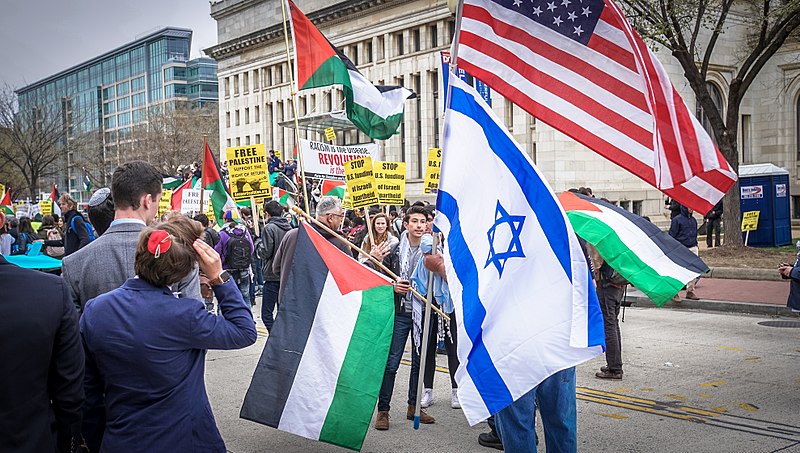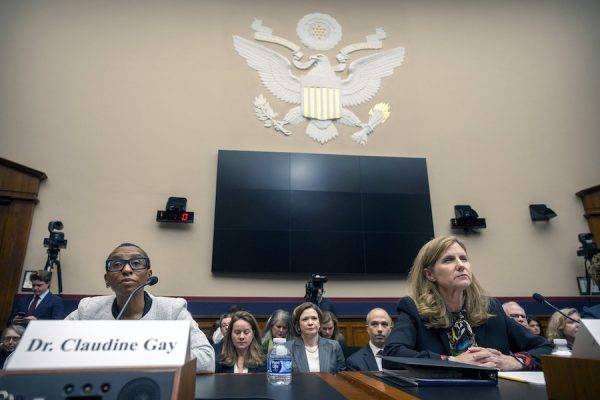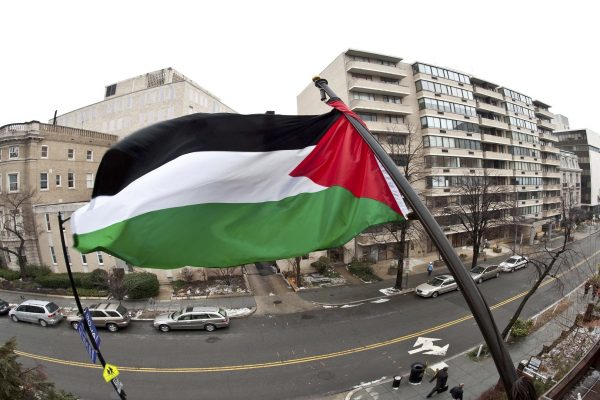A village boy once asked his local priest, “Father, when you go to sleep, where do you lay your beard, under or over your blanket?” Ever since he heard the question, the priest couldn’t sleep through the night. If he laid his beard under the blanket, he felt hot; if his beard was over the blanket, he got cold. He had always slept fine, without waking. But once he was asked to pick a single side, neither one seemed comfortable.
As a Palestinian citizen of Israel, I have always found the notion of a ‘Jewish and democratic country’ a contradiction in terms.
Such is the case with the concept of Israel as a “Jewish and democratic country.” As a Palestinian citizen of Israel, I have always found the notion a contradiction in terms, a source of unfair Jewish privilege. The very proposal of this phrase, the democratic half of which was codified into Israeli law in 1985, turned into a national obsession: Which would be more important, the Jewish or the democratic side? On whichever side of the equation you gripped, something went awry.
Now Netanyahu and his far-right cronies have finally secured the Nation State Law, which was passed by the legislature in July and has elements of apartheid. It all started in the 1990s with discussion about the definition of Israel as a country, and what the phrase “Jewish and democratic” might mean. Sure enough, this discussion rolled over to the topic of Palestinian-Israeli negotiations. Since peace talks collapsed in 2014, Netanyahu has demanded that Palestinians not only recognize Israel according to UN agreements, but also that they recognize the country as the nation-state of the Jewish people.
A roadblock to peace negotiations, this demand contradicts all diplomatic precedents. In the Egyptian-Israeli Peace Agreement of 1979, Prime Minister Menachem Begin, a Likud member like Netanyahu, never asked Egypt to recognize Israel as the nation state of the Jewish people. Likewise, in Israel’s peace agreement with Jordan in 1994, Prime Minister Yitshak Rabin didn’t make such a demand of King Hussein. Nor did the 1993 Oslo Accords.
Make no mistake: prejudice against Palestinian-Arabs is nothing new in Israel, especially with regard to the distribution of land and housing. In the occupied territories, Palestinians are subjected to a completely different legal system than the settlers. There have been different forms of racism toward Palestinian citizens of Israel who live within the Green Line. According to Dirasat, The Center for Arab Law and Policy, one thousand new Jewish towns and cities have been officially established, whereas there have been no new municipalities for Arab communities, apart from seven small towns for Bedouins in the Negev region. Almost all of the industrial regions are located within Jewish-majority municipalities. There is not a single Arab university president. All the heads of banks are Jewish, as are all the heads of public service offices, where Arab citizens are only allowed to fill the middle ranks. And, yet, the right-wing extremists who control Israel’s government were greedy for even more privilege, and they want their privilege protected by law.
Their greed will likely have consequences. As the former Israeli diplomat, Alon Liel, commented, “South African apartheid didn’t fall because it was racist, but because it was legalized.” If anyone questions his message, they need only visit a major prison in the United States, where evidence of systemic racism remains hidden in plain sight, perpetuated in part because it is not legally sanctioned.
Thus, if there is a silver lining in this cruel and reckless law, it could be this: the Nation State Law gives legal standing to racist practices that were already part of government norms. As long as this prejudice was expressed in isolated decisions—one allocation here, one permit denial there—international bodies could not address it directly. But the current Israeli government, in keeping with Trump’s new international order, is now proud of its discriminatory practices. The Trump administration will not bat an eye at this legislation, but other countries in the international community will not ignore it. At the beginning of September, members of the Arab Majority Joint List party met with representatives of the European Union to enlist their help in reversing the law and rejecting all the practices it represents.
A Law that Turns Arabs into Thin Air
What are the critical elements of the new law? It comes in eleven sections, the first of which lays out three “basic principles.” First, it states, “The Land of Israel is the historic homeland of the Jewish people, in which the State of Israel was established.” It also declares, “The State of Israel is the nation state of the Jewish people, in which it realizes its natural, cultural, religious and historical right to self-determination.” And, finally, it claims, “The right to national self-determination in the State of Israel is unique to the Jewish people.”
In their mirror image, these clauses declare the dispossession of Arab and Palestinian rights. They negate the right to self-determination for the Palestinian people within any part of the broad territory that is considered the “Land of Israel” according to Jewish tradition. This violates both the UN declaration of 1948, which grants the Palestinian people the right to establish an independent country, as well as the Oslo agreements, which have formed the basis of peace negotiations for a quarter of a century. The clauses also deny the national and civil standing of the Arab population in Israel. With no mention of the existence of Arab citizens in the Nation State Law, nor of the word “equality,” the law attempts to turn 20 percent of the country’s population into thin air. As if that weren’t enough, the law gives Jewish Israelis yet another privilege: “The state views the development of Jewish settlement as a national value, and shall act to encourage and promote its establishment and strengthening.” Jews will be encouraged to build and develop land, while Arabs will not. And the law downgrades the Arab language, until now considered an official state language, to one with merely “special status.”
When the UN approved the establishment of the State of Israel, its Resolution 181 stipulated that the act of the country’s founding was to allow for Jewish self-determination. However, once established, the country would be required to treat all its citizens with full equality. That spirit is even more clearly expressed in the Israeli Declaration of Independence of May 1948, which states that Israel “will ensure complete equality of social and political rights to all its inhabitants irrespective of religion, race or sex” and “will guarantee freedom of religion, conscience, language, education and culture.”
The Declaration of Independence established these important principles in order to fulfill the UN requirements for the country’s foundation. Its third paragraph required that the two new states, Israel and Palestine, would commit to the principles of freedom, equality, and democracy. Resolution 181 also explicitly forbade the dispossession of Arab land in the Jewish state and Jewish land in the Arab state, declaring that land transfers could only be required for the purpose of public needs. As is well known, most of the private Arab lands were seized by the Israeli state, including the town of Ma’alul, from which my parents were expelled in 1948 and which was completely destroyed. My children and I, though citizens of Israel, are forbidden from returning to the town.
The UN resolution also states that the “stipulations contained in the declaration are recognized as fundamental laws of the State and no law, regulation or official action shall conflict or interfere with these stipulations, nor shall any law, regulation or official action prevail over them,” and that “no modifications shall be made in them without the assent of the General Assembly of the United nations.” Finally, “Any dispute relating to the application or the interpretation of this declaration shall be referred, at the request of either party, to the International Court of Justice.”
The Impact of the Law Thus Far
Less than a month has passed and we are already feeling the consequences of the Nation State Law on the ground—disproving those claims that it was an empty rhetorical gesture. On Friday, August 24, three Arab men—one who identified himself to the public as a doctor, another as a nurse, and the last who remained anonymous—were visiting Kiryat Haim beach in the north of Israel. A young Jewish man approached them and asked if they were Arab. When they answered, “yes,” the young man walked away. He returned several minutes later with a group of roughly ten other young men, wielding chains, knives, and clubs, according to one of the victims. The armed mob brutally attacked the three Arab men and would have likely murdered them, if not for the intervention of another Jewish man named Yair Elalouf.
Elalouf shared his experience with Ynet, a mainstream Israeli news source:
I saw a group of young [Jewish] Russian men beating [the three Arab men] with clubs and chains. They jumped three people there, who were already unconscious on the ground, covered with blood. . . . One of them asked me for help, said they were going to kill them. I went there, I got the young guys away from there, and called the police. I did what I thought was right, to help them.
At least eighty people looked on but did not intervene, Elalouf reported, adding: “I did what every human being is supposed to do.” Netanyahu would not agree with Elalouf’s sense of basic human decency. The prime minister didn’t see any need to step up to defend these three victims, citizens of the country whose security he is supposed to protect. He never visited them in the hospital, nor published a statement of condemnation.
If you parse the Nation State Law carefully, it becomes clear that its ultimate goal is a country without Arabs. In case we had any doubt of this, recall that Netanyahu declared as early as fifteen years ago, at a conference in Herzeliyah, that Arab citizens in Israel posed a demographic threat.
Maybe if the supporters of this law had passed it seventy years ago, they would have fared better; it would have been more in keeping with the spirit of the times. In 1948 more than 750,000 Palestinians were expelled over the border. Expelling an additional 160,000, “the demographic problem” would have all but disappeared. But to create a purely Jewish state today, one would have to expel two million people. And this of course does not include the West Bank, which many on the right would like to include as part of the Jewish state.
More importantly, the law has missed its historical moment because we, Jewish and Arab citizens, have in fact already created a shared life here. Yes, there have been positive trends in Israeli society, and they will win out. The renowned scientist Peretz Lavie, president of the Technion—one of the most competitive educational institutions in the country—proudly shared that 20 percent of his students are of Arab-Palestinian descent. That means that our community’s representation at the Technion is proportional to our numbers within the country as a whole. Even better, 45 percent of those students are women, which is a fairer gender distribution than among Jewish students, or in any other educational institution in the Middle East. Similar signs of progress have also become visible in medicine, in pharmacology, in economics, and in culture. In sectors of “the deep state”—that is, among state workers and academics—many understand that the success of the Arab community will also strengthen the country’s economy and well-being on the whole.
The success of Arab-Palestinian citizens of Israel reflects our own talents and determination. It also reflects the wide segments of Jewish society that believe in equality and who feel that unfair distribution of rights ultimately hurts them as well. A great many Jewish citizens have concluded that a healthy society values equality and solidarity. They see discrimination as hurting the whole society, in material ways and also in anger, bitterness, and hate—all of which will lead to more violence. Remember: 55 parliament members voted against this law, while a small majority of 62 voted in favor. Even in some right-wing circles, people see the law as a sign of moral decay and cause for political isolation.
And the grassroots resistance has been significant. Among other events, including a massive public Arabic lesson, a joint Arab-Jewish protest in Tel Aviv on August 11 drew at least 30,000 people to the streets. In the past, anti-occupation or anti-racism protests have either been organized by Jews in Jewish-majority areas or by Arabs in Arab-majority towns. For demonstrations in the metropolitan Tel Aviv, the organizers have almost always been Jewish leftists, who did all of the planning, then asked their Arab-Palestinian friends to show up. Not here. The event was planned by the Arab Higher Monitoring Committee, composed of various government and public leaders. At least 10,000 Jewish protestors came to support the Arab community this time, not to commandeer their vision. Never in the history of Israel has there been an event of Jewish-Arab solidarity at this scale, and with this degree of true parity.
The right-wing media surely hoped that this demonstration would turn violent or chaotic. But it didn’t. Since they couldn’t find one stone thrown or one body pushed, right-wing pundits and politicians complained that some demonstrators waved Palestinian flags (next to Israeli flags, mind you). But these petty media attacks looked pathetic next to the beauty and the solidarity that flowed through the streets of Tel Aviv that night. It was a picture that captured all that is possible, that showed us what true equality would look and feel like on the ground: Arabs from the Negev, wearing their traditional dress, marched with their heads high next to young Jews and Arabs in jeans, who sang together about equality and about dignity in Arabic and in Hebrew, as if that were completely natural for them.
Mark this moment. After seventy years, a significant coalition of Jews and Arabs has been created, united around the same basic aspirations, able to work together without uniformity of opinion. This public coalition has finally come out of the closet—people who have decided to accept, rather than deny, the lessons of history. Let all the old arguments against Jewish-Arab solidarity be sounded: this is a new generation, for whom the partnership between our peoples feels not only viable, but natural.









